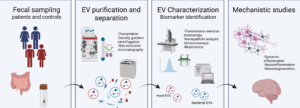Xiang Lab
Exploring Fecal EVs for Diagnosis and Gut-Brain Communication in Parkinson’s Disease
Our research group investigates the diagnostic potential of fecal extracellular vesicles (EVs) in Parkinson’s disease (PD) and their role in gut-brain communication. This work builds on growing evidence linking early PD to inflammatory processes in the gastrointestinal tract. We isolate and purify EVs and subpopulations from fecal samples using a combination of purification techniques, including ultracentrifugation, density gradient centrifugation, and advanced size exclusion chromatography. These EVs are characterized for bacterial and host-derived markers using electron microscopy, nanoparticle tracking analysis, immunoassays, and multi-omics approaches including proteomics, metabolomics, and RNA profiling. In close collaboration with multidisciplinary teams, we aim to define EV subpopulations and identify biomarkers that differentiate early-stage PD from healthy individuals using non-invasive, home-based fecal sampling. We also explore how gut-derived EVs transport bioactive molecules across biological barriers and influence gut and brain function in the context of systemic inflammation, neuroinflammation and neurodegeneration.
Principal Investigator:
Prof. Dr. Wei Xiang
Group leader


